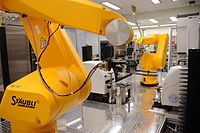
Photo from wikipedia
High-throughput screening (HTS) is a large-scale hierarchical process in which a large number of chemicals are tested in multiple stages. Conventional statistical analyses of HTS studies often suffer from high… Click to show full abstract
High-throughput screening (HTS) is a large-scale hierarchical process in which a large number of chemicals are tested in multiple stages. Conventional statistical analyses of HTS studies often suffer from high testing error rates and soaring costs in large-scale settings. This article develops new methodologies for false discovery rate control and optimal design in HTS studies. We propose a two-stage procedure that determines the optimal numbers of replicates at different screening stages while simultaneously controlling the false discovery rate in the confirmatory stage subject to a constraint on the total budget. The merits of the proposed methods are illustrated using both simulated and real data. We show that, at the expense of a limited budget, the proposed screening procedure effectively controls the error rate and the design leads to improved detection power.
Journal Title: Statistics in medicine
Year Published: 2019
Link to full text (if available)
Share on Social Media: Sign Up to like & get
recommendations!